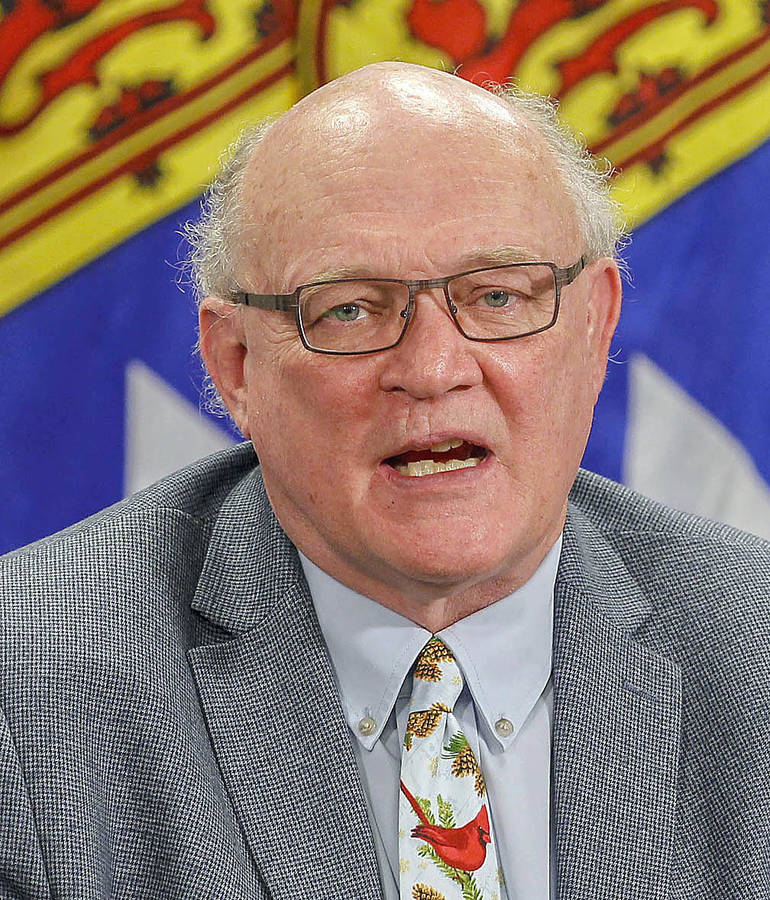
2021-01-06
Coping with COVID
by AMEETA VOHRAAs Nova Scotia's Chief Medical Officer, Dr. Robert Strang has the weight of the province on his shoulders. He's been the face of Nova Scotia's COVID-19 pandemic response. It's not his first pandemic. Coming into COVID-19, he could fall back onto his experiences from overseeing responses to H1N1, SARS, and Ebola.
Strang explains that the 2009 H1N1 pandemic was much less complicated because health officials knew a lot about the virus and the vaccine.
He describes how the current pandemic went from a public health event to a health event to a societal event, within a space of a couple of months. "Until you are in it, I don't think anybody can truly understand the breadth and depth of all the issues that would unfold."
Strang and his team spoke with public health colleagues from coast-to-coast, gathering information to make quick decisions that would impact every aspect of the province.
He recalls how people that work in health care-including labs, primary care testing centres, hospitals, and government groups-stepped up for a collaborative response to the health crisis.
That response had a rippling effect on the economic, social, and communal aspects of Nova Scotians' lives. "People have said, "We understand it's necessary, and we're trying to get on board. do what we need to do to keep each other safe," says Strang.
He adds that people should take pride in how we've adapted.
"That whole sense of collaboration being in this together and a sense of community that's evolved out of this in many ways that I've seen are wonderful things that we can be proud of," Strang says. "There are some interesting innovations, like how we move forward rapidly with things like virtual care in the health care system. We've had different models of how we support people that are homeless during the first wave and having a more hotel model rather than shelters."
Strang represents a large team, with a variety of experience and expertise.
"There are hundreds of people, first on my team and the department of health and wellness, public health across the province and in the whole health system," Strang says. "They are... working extremely long hours, being very creative and innovative. It's so encouraging how everybody has come together and done what's necessary, many problems big and small, and kept things moving forward, all the while staying together and focused on our collective work around COVID in a very positive way."
"I want to thank Dr. Strang, as he's been working very hard with every department with putting in great protocols," Premier Stephen McNeil said in a mid-December press conference. "I want to give a shout out to public health: Dr. Strang and his team has been doing tremendous work."
It's all in a day's work. "My job is to understand all of the different pieces knowing that there are teams of people involved in the details of all those pieces," Strang explains. "My day is making sure I'm touching bases with all the places that I need to so I am up to date and provide input."
The work usually continues into the evening. "I'm not able to do things that I should be doing, especially being physically active to keep myself healthy ... time away from work to be mentally healthy. But I'm doing okay," Strang says. "My family has put up with lots of me, not nearly being as available as I should be as a husband and a father, and I thank them for that."
But he does make time for local good causes. Recently he helped raise money for the Make-A-Wish Foundation by rappelling down 15 storeys of the Westin Nova Scotia. He visited seven-year-old Hughie Dauphinee after learning his young fan was born with a left cleft and palate. Also, he donated ties worn during the pandemic media briefings to decorate a Christmas tree that raised $8,000 for the Mental Health Foundation of Nova Scotia.
"That's just me walking the talk," he says. "I always talk a lot in my briefings that we all need to take care of each other to build a positive community."
During the COVID-19 pandemic, the Chief Medical Officer has been in a difficult spot when making decisions on restrictions. Those have included places of worship, sports, and recreation. Additionally, Strang knows people in this province were hoping for a late Christmas miracle: restrictions lifted for family gatherings during the holiday season.
He hopes that people will look at how these restrictions will benefit the province in the long run. It's also a balancing act about finding that common ground between minimizing the impact and making the right decision that protects individuals. None of the decisions have been lightly, but for Strang, he must consider the vulnerable populations and communities.
"All of these are recognizing the importance of faith and faith gatherings, whether it's sports and recreation, arts and culture, those are what make our society vibrant and support that people practice their faith," Strang says. "Things have to be different. Ultimately, it's finding a way to allow those to continue as much as we can. When we have to stop, hopefully, we are only be stopping them for a short amount of a time as necessary."
Since the pandemic began, Strang and McNeil have appeared together to update media. The Chief Medical Officer's role isn't political and Strang says he has never felt constrained or pressured to make a politically expedient decision.
"The premier is ultimately elected to lead this province... he's always put the health of Nova Scotians first," Strang says. "He listens when I give advice. I think that's one of the fundamental successes that we have in Nova Scotia, unlike certainly in other countries, even in other provinces and territories, where there's been more politicization of this event. "
There's been little public criticism of Nova Scotia's response, with most objections coming from science-deniers, such as the people opposed to vaccines and mask-wearing. "It's absolute nonsense," Strang says. "People need to understand [those beliefs] for what they are and how very harmful they can be. Hopefully, the vast majority of people are trusting what public health and the governments are putting forward because we plan to protect Nova Scotians."
2021 will be just as busy for Strang, as the COVID vaccination program ramps up. And the risk of new waves of sickness continue.
"We remain focused on that with our combination of very innovative approaches to testing," Strang says. "I do believe we are leading the country in many ways, combined with public health follow-up around cases and contacts, looking at how we use the restrictions in a limited way, but being able to act very quickly and firmly when needed."
And the vaccine doesn't mean a reprieve from those public health precautions. "That will continue to be our approach over the next six to 12 months while we roll out the vaccine, and see what role the vaccine plays in being able to have a different approach," Strang says. "We don't know what or where COVID will be and ultimately play a role in our ongoing infectious world and infectious diseases. We have to stick with what we're doing, add in the vaccine, and hope for the best as we get through 2021," says Strang.
This is an abridged version of an article that first appeared in Advocate's Halifax Magazine.






